Description
The Nuclear Age Hardcover
by Tim O’Brien (Author)
The Nuclear Age is about one man’s slightly insane attempt to come to terms with a dilemma that confronts us all—a little thing called The Bomb. The year is 1995, and William Cowling has finally found the courage to meet his fears head-on. Cowling’s courage takes the form of a hole that he begins digging in his backyard in an effort to “bury” all thoughts of the apocalypse. Cowling’s wife, however, is ready to leave him; his daughter has taken to calling him “nutto”; and Cowling’s own checkered past seems to be rising out of the crater taking shape on his lawn, besieging him with flashbacks and memories of a life that’s had more than its share of turmoil. Brilliantly interweaving his masterful storytelling powers with dark, surreal humor and empathy for characters caught in circumstances beyond their control, Tim O’Brien brings us his most entertaining novel to date. At once wildly comic and sneakily profound, The Nuclear Age is also utterly unforgettable.
In 1969, 22-year-old Tim O’Brien was drafted and eventually sent to Vietnam. In a memoir, If I Die in a Combat Zone and two works of fiction–Going After Cacciato and The Things They Carried–he revisited the war, crafting gut-wrenching tales of terror, death, and futility among the rice paddies and jungles of Southeast Asia. In The Nuclear Age the author explores the road not taken: his hero, William Cowling, avoided the draft and spent the 1960s, instead, in a welter of antiwar radicalism. But soon one begins to wonder how different life in the underground, with its strange mix of idealistic visionaries and glory-seeking psychotics, really is from the battlefields of Vietnam. Enlisted in the ranks of an antiwar paramilitary organization in Florida, William remarks to his radical girlfriend Sarah that the group is “like a death squad. Can’t tell the good guys from the bad guys, they’re all gunslingers. Completely scrambled. But it’s lethal. I know that much, it’ll kill somebody.” Nevertheless, he sticks it out in a noncombatant capacity and resurfaces several years later at the end of the war as a profitable trader in uranium.
Success hasn’t dulled William Cowling’s survival instinct, however; at the novel’s start in 1995, the now-middle-aged businessman is busy digging a bomb shelter in his back yard. Nuclear war has been a particular obsession of his since those childhood drills back in the mid-1950s during which he was expected to crawl under his desk at school and cover his head against fallout. Forty years later, he still isn’t taking any chances. His daughter thinks he’s crazy, his wife is on the verge of leaving him, but still he digs–and as he digs he reviews the events in his life that have led up to this moment. The Nuclear Age is especially strong when it focuses on William’s childhood and the complex web of relationships that exist within families. Less successful is O’Brien’s portrayal of his character’s obsession with nuclear war; though we are meant to see William as the only truly sane man in an insane world, all too often he comes across as genuinely cracked. The book has many strengths, not least among them being Tim O’Brien’s fierce intelligence, black wit, and eloquent prose.
Hardcover: 312 pages
Publisher: Alfred A. Knopf; 1st edition
The Nuclear Age_ recounts one person’s search for safety and sanity in a world that is anything but safe and sane. To develop this theme, Tim O’Brien uses William Cowling, the narrator of this book , as his instrument. The novel opens in 1995 with William, debatably insane, digging a huge hole in his backyard for use as a shelter (or is it meant to be a grave?) for his wife, daughter, and himself against an impending nuclear war.
Growing up in the 1950’s I recall being extremely fearful of a nuclear war with the then-Soviet Union. I remember gazing in terror at a photograph on the cover of the New York Daily News of a huge mushroom cloud, with the newpaper reporting the Soviet Union testing a 100 megaton hydrogen bomb that was capable of destroying civilization 1000 times over. Like William, I would occasionally lay awake in bed wondering if the next day would be my last and also, like William, being afraid to share my fears of doomsday with my parents.
A child, naturally vulnerable and unfamiliar with the world around him needs to know that he is loved and protected from danger by his parents. When he is constantly bombarded by the media with the imminence of death from nuclear annihilation, even his parents are rendered totally impotent by that possibility. Building a shelter from a ping pong table with a roof lined with “lead pencils” may seem like the only answer to this child.
Years later William, who is a pacifist by nature, chooses to dodge the draft during the madness and carnage that was the Vietnam War. Even then he cannot escape death: all those who are closest to him, including his parents, all die. Even Sarah, his college cheerleader queen, turned anti-war revolutionary, is completely baffled by her imminent demise. Maybe if William had really chose to love her she could could have been protected. In the present, William’s shadowy, former flight attendant wife, can only make fun of his fears by pinning puzzling, inscrutable poems that she composed to his clothing.
I agree with those who say that the best parts of this book are those dealing with William’s childhood experiences, which includes his relationship with his parents. The sessions with his equally troubled therapist, Charles Adamson, who identifies and verbally empathizes with William’s problems, are just priceless. I also liked the variation in the author’s writing style, from a standard narrative during William’s childhood to the near post-modern, sometimes stream of consciousness style of 1995. I did feel, however, that the 1995 parts concerning William’s digging of the nuclear shelter a bit over the top. Also, I do not think that even someone like William, who grew up with the fear of nuclear war and who, though suffering great loss all around him would carry his fears of nuclear war with him into the present day. Nuclear terrorism and massive contamination from nuclear power plant material meltdowns seem more believable fears.Shelf wear to dust jacket. 0-394-54286-X.
0-7868-6595-4
Wear to dust jacket. Book is in near mint condition. Writing on the inside cover.
Related products
-
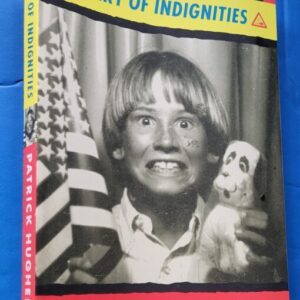
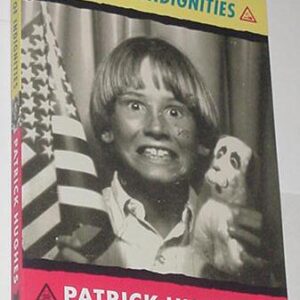
Diary of Indignities TP 1st print M Press Bad News Patrick Hughes Blog
$69.99 Add to cart -
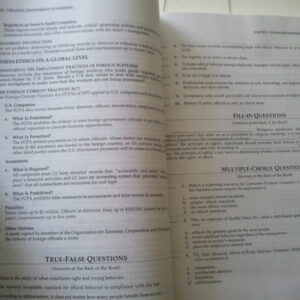
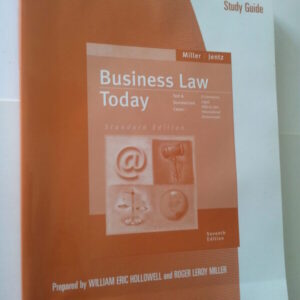
Business Law Today 7th Edition Study Guide SC Hollowell Miller Thomson
$49.99 Add to cart -
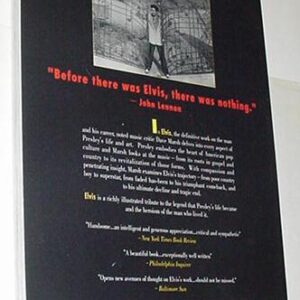
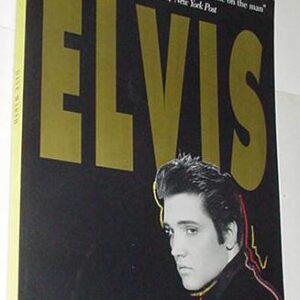
Elvis SC by Dave Marsh Thunder’s Mouth Press NM Condition
$49.99 Add to cart -
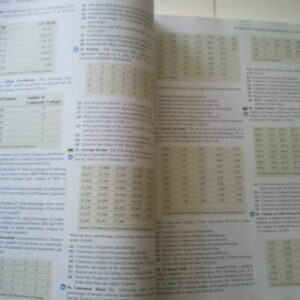
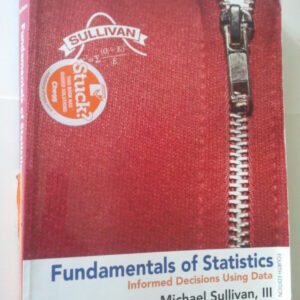
Fundamentals of Statistics SC Informed Decisions Using Data Michael Sullivan III Pearson
$69.99 Add to cart




